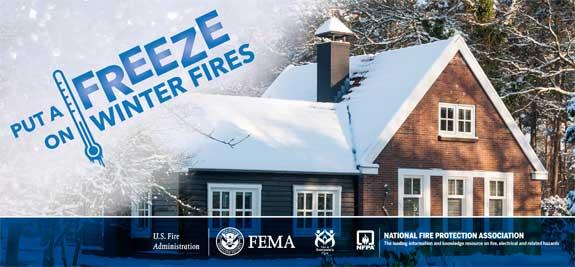Winter Fire Safety Tips
As the chill of winter sets in, it's imperative to focus on fire safety for your business. Our guide on winter fire safety tips can help you manage your property without the fear of fire hazards. At Greater New York Insurance, we provide valuable insights to help you stay safe during the frosty months and keep your business protected with our comprehensive policies.
According to the National Fire Protection Association (NFPA), nearly half (48%) of home heating equipment fires are reported during the months of December, January and February.
NFPA offers steps that can be taken to help prevent heating related accidents to happen. Click here for more information.
Identifying Fire Hazards
Winter carries unique fire risks, primarily due to increased use of heating equipment and potential electrical issues. Being mindful of these risks and implementing winter fire safety tips can help you prevent dangerous situations.
Heating devices like furnaces and space heaters are common culprits behind winter fires. Misuse or poor maintenance can lead to hazardous situations. The risk is compounded by overloaded electrical circuits and faulty wiring, which are particularly dangerous during winter.
Being proactive in recognizing potential fire threats in your building can significantly reduce risks. Look out for malfunctioning electrical outlets, worn-out cords, or overloaded power strips. Keep an eye on equipment for signs of overheating or unusual odors indicating fire risks.
Preventing winter electrical fires demands certain precautions. Ensure all electrical appliances are functioning correctly and have them inspected professionally. Avoid using extension cords as a long-term solution, and never overload outlets. Regularly clean dryer vents to remove lint and keep flammables away from heat sources. With vigilance and preventive actions, you can minimize the risk of winter fires.
Creating a Fire-Safe Environment
Establishing a safe environment is a critical part of winter fire safety. Here are some steps to help you ensure your property is protected.
Install and Maintain Smoke Alarms: Smoke alarms are crucial in early fire detection. Install them throughout your buildings and test them regularly to ensure they are operational. Replace batteries annually to maintain their effectiveness.
Develop a Fire Escape Plan: A well-planned fire escape route can save lives. Discuss and plan escape routes from each room, designate a meeting point outside, and practice the plan regularly to ensure everyone is familiar with it.
Maintain Heating Devices: Keeping heating devices in optimal condition can prevent many fire incidents. Keep flammable items away from heaters, never leave them unattended, and ensure they are turned off when not in use.
Following these winter fire safety tips will help establish a fire-safe environment. Visit gny.com for more information and to explore our range of safety tips and resources for your business.
Holiday Fire Safety Measures
The holiday season brings joy, but also increased fire hazards. Here are some winter fire prevention tips to ensure a safe and festive season.
Handle Christmas Lights Safely: Inspect your Christmas lights for frayed wires or broken bulbs before use. Use quality extension cords and avoid overloading outlets. Always turn off lights and decorations when not in use.
Prevent Candle-Related Fires: Candles add a festive touch, but they can be hazardous. Keep them away from flammable items, use sturdy holders, and never leave them unattended. Consider battery-operated candles for a safer alternative.
These winter fire safety measures will help ensure a safe, enjoyable holiday season. Remember, staying safe and prepared can let you enjoy the holidays without worry!
Submitting a Claim to GNY
To submit a claim after a fire-related loss refer to the guides here.
This material is informational only. It is not intended to be, and is not in fact, a statement, in whole or in part, of GNY’s underwriting guidelines. Nothing said here amends or affects the interpretation, application, or both, of the coverage provisions in any GNY insurance policy; nor do the statements made here constitute a representation that insurance coverage exists for any loss under any GNY policy. Coverage depends on facts and circumstances of each individual claim or loss, the applicable laws, and the policy provisions in the GNY insurance policy.
